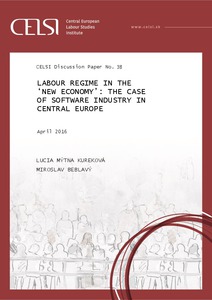Labour regime in the ‘new economy’: the case of software industry in Central Europe
"The software industry in Central Europe has seen a fast growth in exports and in employment over the past decade. Given the core importance of human capital, this paper studies how the institutional framework in the organisation of skill provision and labour market regulation, developed with t...
| Main Authors: | , |
|---|---|
| Institution: | ETUI-European Trade Union Institute |
| Format: | TEXT |
| Language: | English |
| Published: |
Bratislava
2016
CELSI |
| Subjects: | |
| Online Access: | https://www.labourline.org/KENTIKA-19105036124919232189-Labour-regime-in-the-‘new-econ.htm |
| Summary: | "The software industry in Central Europe has seen a fast growth in exports and in employment over the past decade. Given the core importance of human capital, this paper studies how the institutional framework in the organisation of skill provision and labour market regulation, developed with the specific aim of sustaining the growth of traditional manufacturing sectors, provides (or not) adequate conditions for the growth of innovative industries where organisation of the workforce has specific demands. We propose a model of skill hierarchy which helps us to better understand particular employee profiles, employment relations dynamics and recruitment practices in the sector. We show that various forms of labour market flexibility and labour pool flexibility have been important factors in explaining sectoral success and growth, not only in the automotive sector, but also in the IT industry, and have contributed to an improved position of Central Europe in the global division of tasks. The current model might be reaching its limits, however, particularly for more sophisticated and home-grown firms." |
|---|---|
| Physical Description: | 31 p. Digital |

